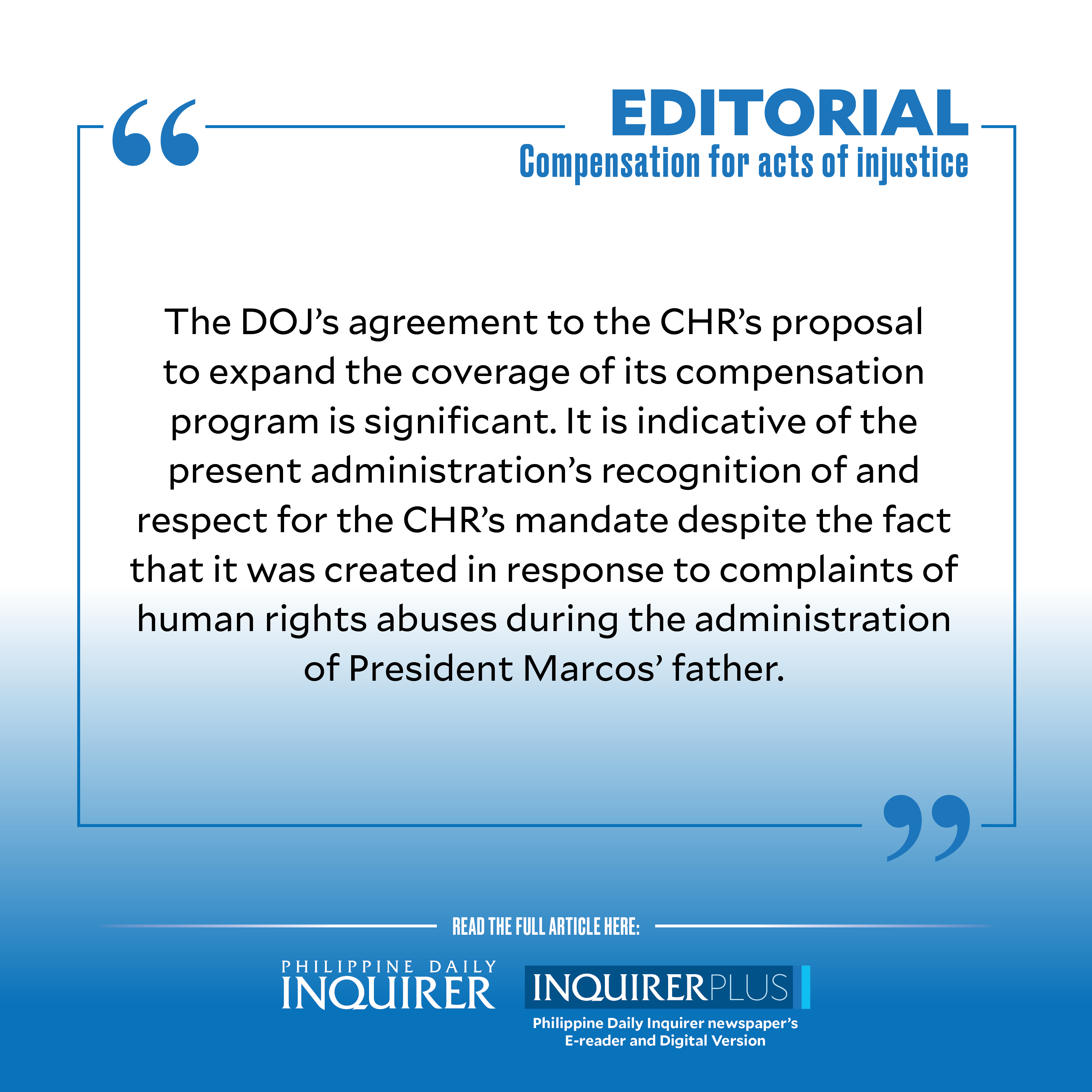Compensation for acts of injustice

What a difference a change in administration makes for victims of extrajudicial killings (EJKs).
Under the Duterte administration, EJKs were par for the course in its handling of the country’s illegal drugs problem which it promised to solve in six months, only to admit later that it would be unable to do so because of its gravity.
In cracking down on dealers and users of prohibited substances, the Philippine National Police did not hesitate to use lethal force against the persons suspected of involvement in the crime.
Then President Rodrigo Duterte justified the violent approach as necessary because, according to him, he did not want the country to suffer from the adverse effects of widespread drug addiction.
For then police chief, now senator, Ronald dela Rosa, who spearheaded that campaign, the victims of the EJKs that accompanied that action were “collateral damage.”
Compensation program
The EJKs from November 2011 to June 2016 are presently under investigation by the International Criminal Court for possible prosecution of the responsible parties.
In a sharp departure from the past administration’s dismissive treatment of EJKs, the Department of Justice (DOJ) has adopted a more humane policy for survivors and victims of EJKs that would allow them to receive compensation for their sufferings.
At present, the DOJ, pursuant to a law, maintains a compensation program for victims of unjust imprisonment, enforced disappearance, or violent crimes.
For unjust imprisonment, the compensation is up to P1,000 per month of imprisonment. In the case of violent crimes, the compensation may reach a maximum of P10,000, or an amount equivalent to the victim’s lost wages and expenses for hospitalization and medical treatment.
The payout is aimed at assuaging or making up (no matter how small) for the injustice suffered by the victim, more so if it was committed by law enforcement authorities.
Tacit admission
The DOJ and the Commission on Human Rights (CHR) recently entered into a memorandum of agreement that would expand the coverage of that program to include victims of EJKs, human trafficking, online sexual abuse, and other grave human rights abuses.
Corollary to the increase in coverage, the two offices urged Congress to increase the maximum compensation payable under the existing compensation program.
Although left unsaid, the inclusion of EJK victims in the DOJ compensation program is a tacit admission that the “war on drugs” implemented by the past administration was flawed, i.e., it did not meet the basic standards of our criminal justice system.
No civilized society will tolerate the commission of crimes or let them go unpunished, in a country like ours that adheres to the rule of law, but a crime suspect should first be prosecuted in accordance with established processes before he or she is convicted, and that his or her guilt should be proven beyond reasonable doubt.
This means, no one, no matter how high he or she may be in the hierarchy of government or supposedly guided by noble intentions, can be prosecutor, judge, and executioner at the same time in a criminal case.
Strong stand against EJKs
Sadly, many of the EJKs in the past dispensation failed to meet those standards. The claim that the killings were justified because the victims allegedly fought back or threatened the lives of the arresting officers had sounded hollow in light of documented reports of abuses in the arrest, detention, and death of crime suspects.
The DOJ’s agreement to the CHR’s proposal to expand the coverage of its compensation program is significant.
It is indicative of the present administration’s recognition of and respect for the CHR’s mandate despite the fact that it was created in response to complaints of human rights abuses during the administration of President Marcos’ father.
That development stands out in light of the efforts of the past administration to practically render the CHR inutile because of its strong stand against EJKs.
Financial reparation
It is heartening to note that the DOJ and CHR had agreed that compensation should also be given to victims of criminal acts other than those mentioned in the law.
The victims of human trafficking, online sexual abuse, and other grave human rights abuses deserve to be given some form of financial reparation for the crimes committed on them.
Admittedly, due to human frailty, injustices cannot be avoided from being committed by a person against another and that commission assumes greater significance or concern if done by somebody who holds a government position.
If that happens, the least that the government can do to mitigate the hurts of any injustice is to give the victim some form of compensation as an expression of the State’s acknowledgment of the wrong or its failure to prevent it from happening.




















